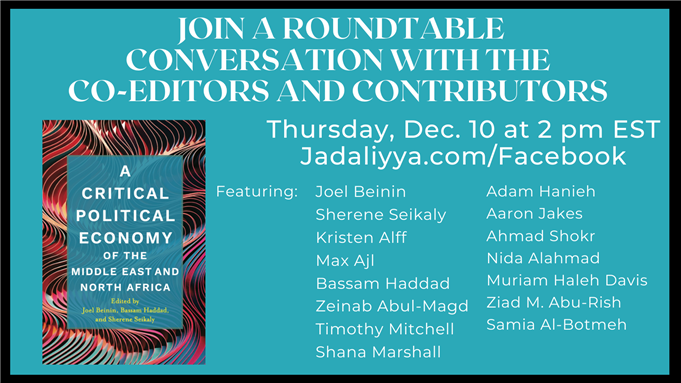| Live Event: Roundtable Conversation with the Co-Editors and Contributors of "A Critical Political Economy of the Middle East and North Africa" Thursday, 10 December 2020 2:00 PM EST/ 9:00 PM Beirut |
AUTHORS
Joel Beinin, Kristen Alff, Max Ajl, Bassam Haddad, Zeinab Abul-Magd, Timothy Mitchell, Shana Marshall, Adam Hanieh, Aaron Jakes, Ahmad Shokr, Nida Alahmad, Muriam Haleh Davis, Ziad M. Abu-Rish, and Samia Al-Botmeh
ABOUT THE EDITORS
Joel Beinin is the Donald J. McLachlan Professor of History, Emeritus, at Stanford University.
Bassam Haddad is Associate Professor at the Schar School for Policy and Government at George Mason University.
Sherene Seikaly is Associate Professor of History at the University of California, Santa Barbara.
ABOUT THE BOOK Available Now at Stanford University Press:
A Critical Political Economy of the Middle East and North AfricaEdited by Joel Beinin, Bassam Haddad, Sherene Seikaly
Series: Stanford Studies in Middle Eastern and Islamic Societies and Cultures
A Critical Political Economy of the Middle East and North Africa represents the first volume produced by the Political Economy Project (PEP), which was established by the Arab Studies Institute in 2015. You may find other publications, events, and resources on the Project’s website. More resources, reviews, and interviews related to this volume will appear regularly on the Political Economy Project website, Jadaliyya, and Middle East Studies Pedagogy Initiative (MESPI).
This book offers a critical engagement with the political economy of the Middle East and North Africa. Challenging conventional wisdom on the origins and contemporary dynamics of capitalism in the region, these cutting-edge essays demonstrate how critical political economy can illuminate both historical and contemporary dynamics of the region and contribute to wider political economy debates from the vantage point of the Middle East.
Leading scholars, representing several disciplines, contribute both thematic and country-specific analyses. Their writings critically examine major issues in political economy—notably, the mutual constitution of states, markets, and classes; the co-constitution of class, race, gender, and other forms of identity; varying modes of capital accumulation and the legal, political, and cultural forms of their regulation; relations among local, national, and global forms of capital, class, and culture; technopolitics; the role of war in the constitution of states and classes; and practices and cultures of domination and resistance.
Visit politicaleconomyproject.org for additional media and learning resources. Email us at [email protected] if you wish to review the book.
Reviews
"A thorough and timely collection of essays by some of the top practitioners of Middle East political economy, this book lays bare the human insecurity that is at the root of much of the discontent in the region."
—James Gelvin, University of California, Los Angeles
"This new canonical text will open pathways for research and make the job of educators infinitely easier by reasserting the enduring value of political economy. For too long scholarship has been enchanted by the shibboleths of orientalism and modernization theory—now there is a better way. A tour de force synthesis."
—Brandon Wolfe-Hunnicutt, California State University, Stanislaus
Joel Beinin, Kristen Alff, Max Ajl, Bassam Haddad, Zeinab Abul-Magd, Timothy Mitchell, Shana Marshall, Adam Hanieh, Aaron Jakes, Ahmad Shokr, Nida Alahmad, Muriam Haleh Davis, Ziad M. Abu-Rish, and Samia Al-Botmeh
ABOUT THE EDITORS
Joel Beinin is the Donald J. McLachlan Professor of History, Emeritus, at Stanford University.
Bassam Haddad is Associate Professor at the Schar School for Policy and Government at George Mason University.
Sherene Seikaly is Associate Professor of History at the University of California, Santa Barbara.
ABOUT THE BOOK Available Now at Stanford University Press:
A Critical Political Economy of the Middle East and North AfricaEdited by Joel Beinin, Bassam Haddad, Sherene Seikaly
Series: Stanford Studies in Middle Eastern and Islamic Societies and Cultures
A Critical Political Economy of the Middle East and North Africa represents the first volume produced by the Political Economy Project (PEP), which was established by the Arab Studies Institute in 2015. You may find other publications, events, and resources on the Project’s website. More resources, reviews, and interviews related to this volume will appear regularly on the Political Economy Project website, Jadaliyya, and Middle East Studies Pedagogy Initiative (MESPI).
This book offers a critical engagement with the political economy of the Middle East and North Africa. Challenging conventional wisdom on the origins and contemporary dynamics of capitalism in the region, these cutting-edge essays demonstrate how critical political economy can illuminate both historical and contemporary dynamics of the region and contribute to wider political economy debates from the vantage point of the Middle East.
Leading scholars, representing several disciplines, contribute both thematic and country-specific analyses. Their writings critically examine major issues in political economy—notably, the mutual constitution of states, markets, and classes; the co-constitution of class, race, gender, and other forms of identity; varying modes of capital accumulation and the legal, political, and cultural forms of their regulation; relations among local, national, and global forms of capital, class, and culture; technopolitics; the role of war in the constitution of states and classes; and practices and cultures of domination and resistance.
Visit politicaleconomyproject.org for additional media and learning resources. Email us at [email protected] if you wish to review the book.
Reviews
"A thorough and timely collection of essays by some of the top practitioners of Middle East political economy, this book lays bare the human insecurity that is at the root of much of the discontent in the region."
—James Gelvin, University of California, Los Angeles
"This new canonical text will open pathways for research and make the job of educators infinitely easier by reasserting the enduring value of political economy. For too long scholarship has been enchanted by the shibboleths of orientalism and modernization theory—now there is a better way. A tour de force synthesis."
—Brandon Wolfe-Hunnicutt, California State University, Stanislaus

 RSS Feed
RSS Feed

